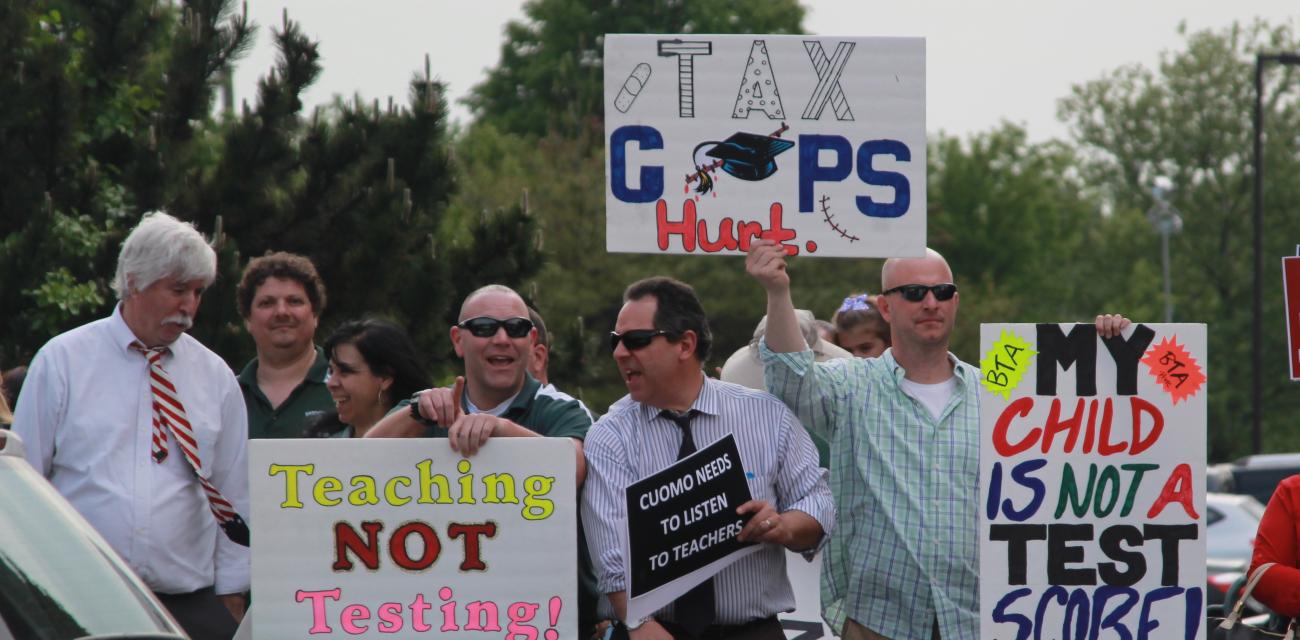In an impressive sign of unity, local teacher unions across New York state have come together to reject a law that has caused more harm to public education than any reform in recent memory.
This spring, the 2018 Representative Assembly of the New York State United Teachers (NYSUT) will convene to discuss the challenges facing teachers unions in our state and goals for the future.
One of the items on the assembly agenda will be the adoption of a resolution challenging the legality and the morality of the New York State Property Tax Cap Law. The text of the proposed resolution is as follows:
WHEREAS, the imposition of a property tax cap equal to the annual increase in the consumer price index or 2%, whichever is LESS, results in insufficient revenue for school districts; and
WHEREAS, the "supermajority" requirement to exceed the tax cap effectively establishes minority rule by allowing 40% of voters plus one to override the will of the majority; and
WHEREAS, locally elected school boards in New York reflect community
aspirations and values through local decision-making and have enabled school districts to respond effectively to their communities' demographic changes, economic conditions and the priorities of their residents; and
WHEREAS, the experience in other states demonstrates that the public interest is poorly served when state-imposed inflexibility overrides all other considerations in school district budgeting; therefore be it
RESOLVED, that it will continue to be the policy of NYSUT to seek the full repeal of the property tax cap; and be it further
RESOLVED, that, while the fight to repeal the property tax cap continues, NYSUT will continue to seek amendments to the property tax cap law to mitigate some of the law's worst effects, including but not limited to:
-
making it a true 2% cap by limiting tax levy increases to "2% or the rate of inflation, whichever is GREATER";
-
replacing the undemocratic 60% supermajority requirement to exceed the tax cap with a simple majority vote; and
-
providing additional exemptions to tax levy limits for districts experiencing cost increases due to enrollment increases, the imposition of unfunded state mandates, expenditures relating to school safety measures, natural disasters, judgments against aschool district, maintenance and repair of school buildings and tuition payments by a school district for general education or special students, or budgetary increases over which a school district has no control, such as fuel and electrical rates, all retirement
-
system contribution increases, health insurance rate increases and mandated payments to charter schools and non-public educational institutions; and be it further
RESOLVED, that NYSUT's local affiliates are committed to do all within their powerto support NYSUT's efforts to achieve the above stated resolves.
The proposed resolution is significant for many reasons. For one thing, it represents a coming together of NYSUT's 600,000 plus membership against a law that, in reality, does not impact all of the local unions in the state. For example, the United Federation of Teachers (UFT) in the New York City public schools, does not operate under the tax cap law.
In unity there is great strength. Having all locals in our state resolved against the tax cap should carry much greater significance in the eyes of those in a position to amend or repeal the law.
The state property tax cap legislation was signed into law by Governor Cuomo in 2011. On its surface, the law represents a step towards fiscal responsibility by restricting the amount local school districts can spend on the education of their children. In practice, however, the flawed logic of the legislation becomes blatantly apparent.
To start with, the tax cap is not actually 2%. It is either 2%, or the rate of inflation, whichever is lower. In fact, the only years in which the cap was actually 2% were the first two years when the law was enforced, 2012 and 2103. Since then, the cap has dropped below that number, shrinking down to 0.12% in 2016.
Here’s the problem….
Each school year a district is faced with increased costs for doing business such as the price of new textbooks, insurance, general maintenance and heating and electricity. Regardless of the fact that a school district must cap the amount it requests from residents at 2% (or less), the increase in costs to the district to provide resources to the children and keep the heat and the lights on are NOT capped at the same percentage.
What plays out from here is obvious. If the district has less revenue to cover operating costs, it must balance its budget by making cuts to other district expenditures. The end result is a reduction in program offerings, increased class sizes, excessing of teachers and a reduction in necessary office and support staff.
As long as the tax cap law stays in place, the cycle of reductions will continue. If the costs the district must incur continue to increase beyond the amount of increases it can request from the community, the programs and the quality of education the district can provide to the community will decrease. This is a mathematical certainty.
The truth of the matter is that school taxes represent a small percentage of the overall tax burden facing Americans. However, it does happen to be one tax on which Americans get to vote each year. As a result, when complaints arise about taxes, school taxes tend to be the ones targeted the most for reform. The unfortunate consequence of this is a reduction in funding to schools and a reduction in the quality of public education school districts can provide.
For these reasons, NYSUT is united against the tax cap and planning to use its influence and resources to either amend or put an end to a law that has harmed our children for the past 7 years. The resolution scheduled for adoption this spring is a strong first step in that process.
 2017 NYSUT Communications Award - Best Website
2017 NYSUT Communications Award - Best Website
